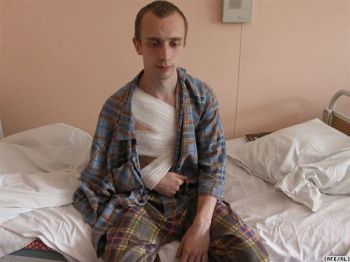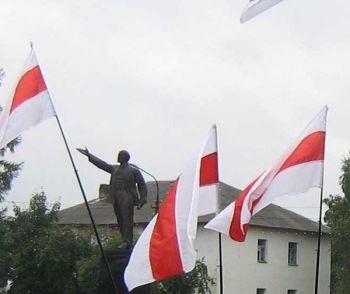Many expected Belarus to say “never again” to its totalitarian past, as on 27 July 1990 the Supreme Council of the Byelorussian Soviet Socialist Republic (now the Republic of Belarus) proclaimed the full sovereignty of the country.
However, 20 years after the act of independence, the authorities still persecute democratic activists.
Feeling as a successor of the Soviet establishment rather than of a Belarusian nation-state, the current government led by the President Aliaksandr Lukashenka has never shared the enthusiasm of opposition regarding the independence from the Soviet rule.
Even now, amid never-ending conflicts with the Russian Federation and official recognition of the value of independence, 27 July is still a day when democratic activists are detained, persecuted and assaulted – only because they do not imagine the independent future of Belarus under the rule of the current regime.
Collarbone broken “accidentally” On 26 July, three activists – Vasil Paliakou, Yury Hlushakou and Larysa Shchyrakova – were detained in Homiel, second-biggest city of Belarus, for handing out postcards dedicated to the Independence anniversary, spring96.org reported.
On 26 July, three activists – Vasil Paliakou, Yury Hlushakou and Larysa Shchyrakova – were detained in Homiel, second-biggest city of Belarus, for handing out postcards dedicated to the Independence anniversary, spring96.org reported.
Another activist Uladzimir Niapomniashchykh was arrested for wearing a T-shirt “For Belarus without Lukashenka! Enough is enough!”
However, these four were rather lucky to stay intact. In a situation of impunity, opposition activists often face physical assault and sacrifice their health for public activism.
The activist of a youth branch of the Belarusian Popular Front (“Youth BPF”) Zmitser Parmon has received a response from the Prosecutor’s Office to his appeal against policement who beat him heavily during a detention on 27 May.
Zimtser together with his fellow-fighter Franak Viačorka were both detained at the beginning of a cycle race to commemorate the Belarusian poet Maksim Bahdanovič. As both were beaten, Zmitser ended up at a hospital, his collarbone broken.
However, after an inspection by prosecutors, no reason was identified to launch a prosecution against the police. Based on testimonies provided by seven policemen, investigators concluded that “bodily injuries were caused by Mr Parmon himself accidentally”.
Rally banned
Not only in custody do the authorities feel unpunished when violating rights of citizens. In Viciebsk, the BPF Party was blatantly banned to hold festive assembly on 27 July.BPF is exactly the party which stood behind the initiative to declare independence in 1990. Now it is not allowed to celebrate it publicly.
Ironically, the party intended to celebrate the 20th anniversary of the Declaration of Sovereignty in a park named after the Soviet Army. The park is one of just three places that had been determined as action sites by the Viciebsk authorities.
Though the BPF submitted the application to the Vitsebsk City Executive Committee, it was dismissed. The formal reason for the dismissal of the application is that the applicants didn’t attach to it the contracts with the medics, the public utilities and the police.
Kastus Smolikau, Chairperson of the Vitsebsk region BPF organization, intends to appeal against this ruling. He states it is completely groundless, as there’s no sense to conclude the aforementioned contracts in the absence of the official permission for holding the action and the absence of concrete information about its date and place.
***
The independent Belarus (former “Byelorussia”) proclaimed itself a democratic country aiming at neutrality.
However, the former Soviet pro-Russian establishment kept an iron grip on the country’s politics and economy. As a populist Aliaksandr Lukashenka was elected a President in 1994, the Soviet-style ideology was reintroduced and Soviet state symbols returned as official ones.
Since 2000, however, the country has reinforced its independence and started to balance between the EU and the Russian Federation.
The government is now stressing the importance of independence. Nevertheless, the official celebration was moved to the day of liberation of Belarus from Nazis rather than the end of Soviet rule, and the divisions regarding the perception of independence remain between confronting camps inside the country.
In the sphere of human rights and democracy, the country is demonstrating no progress, regardless of the so-called dialogue with the EU.
Former civil activists are still kept behind the bars and many are routinely detained amid official declarations that there is no political prisoners in Belarus.


